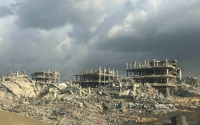27 July 2005Institute for Policy Studies; Phyllis Bennis
**Israel has a unilateral obligation to withdraw its troops and settlers and end its occupation of Gaza as well as of the West Bank and East Jerusalem. But the Gaza "disengagement" is not designed to, and will not result in an end to occupation.
** The "disengagement" will leave Gazans worse off economically, socially and politically than they are now, isolating the 1.2 million Palestinians in a besieged prison surrounded and controlled on all sides by Israel.
** Sharon's goal is to maximize the chaos and televised scenes of Israeli pain and division, so he can refuse any U.S. or international demands that he withdraw from the West Bank and Jerusalem, claiming that the price Israel is paying is too high to go further. "Gaza first" will become Gaza last.
** The construction of Israel's Wall continues despite the rulings of the International Court of Justice finding it illegal; it will soon be completed, locking West Bank Palestinians into tiny cantons separated from each other and from their own land.
** All Israeli settlements - from tiny "outposts" to the largest settlement cities such as Ma'ale Adumim and Ariel - are illegal, violating the Fourth Geneva Convention's prohibition against moving any population from the occupying country into the occupied territory.
There is no question that Israel, as the illegal occupying power, bears full responsibility under international law to end its occupation of Gaza, the West Bank and East Jerusalem. But Sharon's planned "disengagement" from Gaza is not a step towards ending occupation; it is designed to change the character of Gaza’s occupation from direct troops-in-the-streets and settlers-on-the-land occupation to a kind of occupation-by-siege, in which Gaza will be completely encircled by an Israeli fence, as well as Israeli troops and military force. All entry and exit to and from Gaza will be controlled by Israel. The Israeli military will control all crossing points, Israel will control Gaza's skies and seas, the building and operation of any future port or airport will be under Israeli permission (or denied permission), and the people of Gaza will have no ability to move in and out of their land, to ship agricultural products out or bring crucial medicines in, except under intrusive Israeli control.
Although the "disengagement" may well result in the withdrawal of all settlers out of Gaza, and the redeployment of all Israeli soldiers to the Gazan borders (though not completely out of Palestinian territory), Gaza will be far from independent. Israel has announced that it retains what it calls the "right" to reoccupy Gaza at any time it sees fit. Further, Gaza is an inseparable part of the Occupied Palestinian Territories; withdrawing from one sector of that land, while the military occupation of the West Bank and East Jerusalem remains, does not constitute an end to occupation.
Sharon has announced that once the settlers and soldiers are out of Gaza (a process which may take months, because of soldiers remaining throughout the process of demolishing settler houses) Israel will no longer have any responsibility towards the people of Gaza. This is a false claim. Under international law, a besieging power has exactly the same obligations as any other occupying power - to provide for the humanitarian needs of the occupied population, including provision of food, health care, education, etc. Whatever Sharon may claim, "disengaging" from Gaza does not constitute an end to occupation. The end of occupation was defined by the post-World War II Nuremberg Tribunal: "The test for application of the legal regime of occupation is not whether the occupying power fails to exercise effective control over the territory, but whether it has the ability to exercise such power." As long as Israel surrounds Gaza, controlling its borders, skies and seas, it "has the ability" to control the territory. Israel's plan for Gaza will turn the Strip into a big prison, surrounded by guards, in which the 1.2 million Palestinian inmates may be allowed to move on their own within the walls but will remain imprisoned.
Sharon's real plan for the Gaza "disengagement" is to ensure that the process is visibly as traumatic and difficult as possible for settlers, and that it creates as much division and antagonism as possible within Israeli society. While some settler supporters have been kept out of Gaza, others have already been allowed in to establish themselves at an abandoned hotel at Shirat HaYam. The goal is to make the pull-out so chaotic and emotional that Sharon will be able to win U.S. and international support for his claim that "this process has been so difficult, so divisive, that you simply can't ask us to withdraw any further from any other land." Continuing the "end of occupation" to end the siege of Gaza and to include the West Bank and East Jerusalem will be taken off the agenda altogether.
Sharon is already counting on agreement from the Bush administration. In April 2004 Bush sent a letter to Sharon confirming that in any final status agreement, the U.S. would not expect Israel to withdraw to the 1967 borders, but would essentially accept the annexation of huge swathes of Palestinian territory by Israel. In that same letter Bush also claimed the right to deny Palestinians their internationally recognized legal right to return to their homes, stating the U.S. commitment that the Palestinian right of return would only be accepted in the new Palestinian state, not inside Israel where their actual homes are.
Sharon's adviser Dov Weisglass described the disengagement's goal as "the freezing of the peace process…. Effectively, this whole package called the Palestinian state, with all that it entails, has been removed indefinitely from our agenda. … All with a presidential blessing and the ratification of both houses of Congress." While Bush, following his June 2005 meeting with Palestinian president Mahmoud Abbas, spoke of the need for both sides to agree before there could be any changes in what he then defined as the "1949 armistice line" (essentially the same as the 1967 border), that was an oral statement made in a press conference, with no follow-up commitment. There is no indication that the exchange of letters with Sharon does not still stand as the letter of the law for the Bush administration.
While the U.S. and international press and government pronouncements are focused on the Gaza "disengagement," Israel is continuing to construct its massive Wall on Palestinian territory, seizing land and imprisoning Palestinians in tiny cantons. Despite the July 2004 Advisory Opinion of the International Court of Justice, in a case considered at the request of the UN General Assembly, that the Wall is illegal, Israel is rushing construction and will soon have the entire Wall built. The claim that the Wall is designed to protect Israel is false; if that were the case the Wall would be constructed on the Green Line, Israel's 1967 border with the Palestinian territories of the West Bank, Gaza and East Jerusalem. Instead, it is being built almost entirely on Palestinian land, surrounding many Palestinian towns and the entire city of Qalquilya (population 50,000), and dividing thousands of Palestinians from their own agricultural lands and fields, preventing people from reaching schools and hospitals, dividing Palestinians from each other. There is a significant danger that the combination of Israel's redeployment from Gaza and the completion of the Wall, will lead to Israel declaring some version of a Palestinian statelet in the bantustan areas enclosed by the Wall, comprising less than half the territory of the West Bank, along with the prison of Gaza and nothing in Jerusalem. Such a move would make Israel's current violations of international law even more serious and make the obligations of international civil society to work to end the occupation even more urgent.
So - what do we do?
Since governments, especially the U.S. government, have so far been unwilling to take seriously their obligations to hold Israel accountable for its violations of international law, it is up to our global civil society to do it. Both Palestinian civil society organizations and the UN-based International Coordinating Network on Palestine have called for non-violent campaigns of "BDS" - boycotts, divestment and sanctions – against Israel’s occupation and the institutions and corporations that benefit from it
The tactical details will differ in different countries and different regions, but the overall goal is the same: to pressure Israel for compliance with international law and to pressure the U.S. to stop supporting Israel's occupation. The U.S. Campaign to End Israeli Occupation (www.endtheoccupation.org) will be considering various projects within this framework. The Presbyterian Church has already taken the lead in urging a campaign of divestment from corporations that support the occupation. There is a lot of work to be done.
http://www.zmag.org/content/print_article.cfm?itemID=8381§ionID=107






